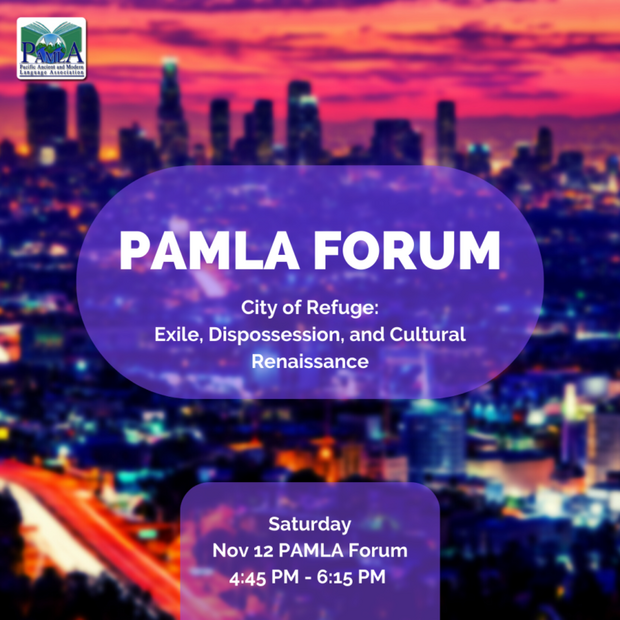Thomas Mann House Events Archive
November 2022
City of Refuge: Exile, Dispossession, and Cultural Renaissance
Los Angeles, UCLA Luskin Conference Center (UCLA Luskin Hotel & Conference Center)

Information
Dr. Alison Rose Jefferson’s presentation will explore California Coastal Zone enclaves and their significance as places within the African American experience. Dr. Jefferson will discuss these spaces, historically and geographically, as connected to California Dream mythology, the urban beach landscape, Southern California beach culture, American history and identity, and contemporary heritage conservation efforts. She will discuss how the Applied History programming, Belmar History + Art developed for Santa Monica, is empowering people with useful knowledge for civic engagement, justice, and equality, while facilitating individual and community pride.
Thomas Mann House Program Director Benno Herz was invited to discuss the work of the Thomas Mann House, the Mann families’ connections to Los Angeles and the network of intellectuals they found there. After fleeing Nazi Germany, writer and Nobel Prize winner Thomas Mann found refuge for himself and his family in the Pacific Palisades, a quiet residential neighborhood in Los Angeles between Santa Monica and the Pacific Ocean. Mann was one of many European intellectuals who fled to Los Angeles, forming a community known as “Weimar on the Pacific.”
Jan Lin will examine dynamics of gentrification and displacement in Northeast L.A. Speculator-investors and corporate developers have subjected Latinx families to rent increases and mass evictions, uprooting social networks instrumental to economic survival. Lin draws attention to the rise of Latinx anti-gentrification movements to resist their displacement and cultural erasure.
Click here for more information.
Participants

Benno Herz is the Program Director at the Thomas Mann House Los Angeles. He worked in the online communication division at the Städel Museum Frankfurt, Germany, before joining the Thomas Mann House. Prior to this, he studied Theater, Film and Media Studies at the Goethe University Frankfurt focusing on digital aesthetics and interface theory. In 2021 and 2022, he taught a Digital Humanities class on European Exile at University of California, Los Angeles. He is co-editor and co-author of the publication Thomas Mann's Los Angeles: Stories from Exile 1940-1952 (Angel City Press, 2022).
Partner
An Event by the Pacific Ancient and Modern Language Association.

Exit Exil. Escape routes and temporary networks
Berlin

Information
This workshop is a continuation of a cooperation between VATMH and KMM that began in the winter semester of 2021/22, from which six short audio features were produced under the project title "Exit Exile. Dialogues" six short audio features have emerged: Master students of the FU Berlin had the opportunity to interview current and former scholarship holders of the VATMH residency programs and to enter into a dialogue with each other in the context of a research with a historical exile person.
In the workshop "Exit Exile. Escape Routes and Temporary Networks," authors, writers, and scholars will engage in conversation. The workshop will discuss, on the one hand, the different forms of escape routes and, on the other hand, the temporary networks and communities that often emerge during the flight - on the way to a place of exile that is as safe as possible and as final as possible.
The discussion begins with the perspective of the historical exiles, especially the intellectuals who had to flee Germany (first) to other European countries and then overseas, to the United States or even to Central and South America, at the latest after the Nazis had seized power.
The discussion will not only remain with a possible historical classification, but will repeatedly establish references to the present.
The following questions will be explored: Which (emigration or flight) paths do exiles generally take? What continuities, breaks and obstacles do the fugitives experience on their paths into exile? What communities do they form with other people who meet the same fate? Are these more or less loose connections, communities of purpose or communities of fate, which make the suffering of the individuals on the run more 'bearable' in the group, so to speak? Or do these loose connections possibly give rise to sustainable networks, structures that could only emerge from the event of flight? Do these communities serve as a substitute for a so-called "home"? What happens after an initially successful flight in the respective transit countries or in the countries of exile that ultimately take in the refugees - possibly forever? How does the relationship of exiles to their country of origin change over the course of their exile? Is exile a temporary state per se, which - in the best case - must be overcome?
Partners
A cooperation of Villa Aurora & Thomas Mann House and the Cluster of Excellence 2020 "Temporal Communities - Doing Literature in a Global Perspective" and the Seminar for Cultural and Media Management (KMM) at Freie Universität Berlin.




